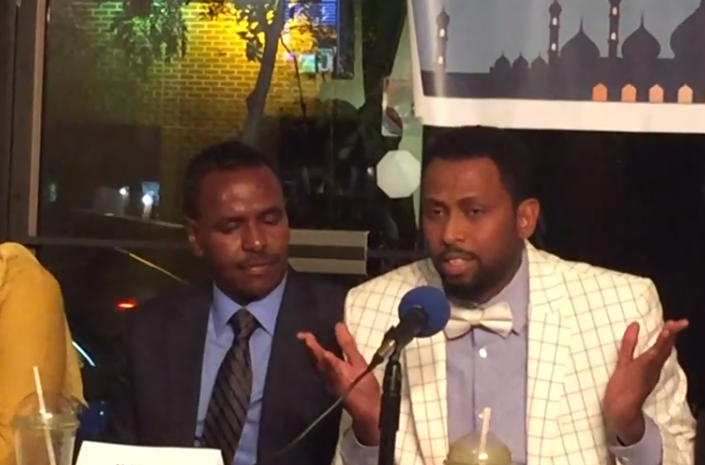Somali-Americans say Donald Trump’s campaign is ‘empowering’ terrorists

Members of the struggling Somali-American community say they are losing the battle to stop Isis recruiting their sons thanks to an inept response to the problem by the US federal government and rhetoric from Donald Trump that, they say, makes the recruiters’ job easier.
Nowhere is the frustration greater than in the drab Cedar-Riverside neighborhood of Minneapolis, where thousands of Somali-Americans who originally fled to the US after the collapse of the Somali government in 1991 now live. It was traumatised last year when the government arrested nine young Somali-Americans on charges of plotting to join Isis in Syria.
“With all this depression, with all this poverty, with the few resources that we have, we always fail to the recruiters and with the powerful behind them, like countries like Saudi Arabia that finance them,” declared Yusuf Abdurahman, whose son Zacharia, is among the nine now awaiting sentencing in the much-watched case. “We will never match.”
Numbering more than 25,000 in the Twin Cites of Minneapolis and St Paul in Minnesota, the Somali-America community is far from unified on the best way forward. Mr Abdurahman was a speaker at a meeting inside the Somali-owned Capitol Cafe in Cedar-Riverside one evening last week called in part to help distribute pamphlets advertising an anti-radicalisation programme devised by the FBI entitled ‘Don’t be a Puppet – Pull Back the Curtain on Violent Extremism’.
But the very sparse attendance at the meeting was a reflection of deeply-felt suspicion within the community of any initiative that has the FBI or any set of government initials attached to it.
However, most are agreed on the need to repel outside voices seen as demonizing American Muslims generally and Somali-Americans in Minnesota in particular.
That has included HBO, the cable channel, which last month announced plans to begin filming the pilot of a new drama series precisely examining the lives of young Somalis disenchanted with home and feeling lured by Isis. Created in association with Kathryn Bigelow, director of the controversial films Zero Dark Thirty and Hurt Locker. it has been tentatively – and perhaps insensitively – entitled, Mogadishu, Minnesota.
Even though the show’s director is the Canadian-Somali musician K’naan, the community it is set to portray is angered by it. Indeed, earlier this month residents of a large tower in Cedar-Riverside where HBO had hoped to be doing some of the filming voted to deny the production company access.
Further excacerbating feelings of isolation and fear in the community was the uncovering of a plot to bomb a residential tower in Kansas City occupied mostly by Somali-Americans. Three members of a white militia group were arrested and charged with developing the plot in the meatpacking town of Garden City, Kansas, last Friday.
Mr Trump, the Republican presidential nominee, is in a category of his own, however, not least because of the call he made last year to ban all Muslims from entering the United States. Then at a campaign event in August, he singled out Minnesota and its concentration of Somali-Americans, calling them a “rich pool of potential recruiting targets for Islamic terror groups”.
It drew the immediate ire of Minneapolis Mayor, Betsy Hodges, who shot back with a Tweet: “Donald Trump, do not go after Minnesota and our Somali population. Just don’t.”
Deeply offensive to many in the community, the remark clearly referenced the ongoing legal case. Of the nine who were arrested in the spring of 2015, six took plea deals after admitting their guilt, including Mr Abdurahman’s son, while the other three were convicted in June this year. Sentencing for all the young men is set for 14 November.’
“He is finger-pointing at our neighbourhoods and saying that’s Sharia area or bad area, I definitely disagree with him,” complained Abdirizak Bihi, a community activist who was also at Capitol Coffee. He said he had invited Mr Trump to come to Cedar-Riverside to see how the community is trying to fight the recruiters first-hand but had had no response from him. “He is really empowering the bad people. How is he empowering them, involuntarily or maybe unknowingly? By alienating the same community that are really victims of terrorisms themselves.”
The notion of Mr Trump aiding and abetting Isis is a theme that has been repeatedly rehearsed by Hillary Clinton on the campaign trail. Mr Trump is giving “aid and comfort” to our adversaries, she recently stated, even going as far as calling him a “recruting sergeant” for Isis.
“He is trying almost to speak for the terrorist organisations, what they want, what kind of response they want,” Jaylani Hussein, Executive Director in Minnesota for the Council of American-Islamic Relations, CAIR, said in an interview in his office. “He is giving them a platform where his rhetoric can be used to continuously mobilize what they are trying to do.”
Mr Hussein and others argue that attacks on the community by figures like Mr Trump or by the former Republican nominee Ben Carson, who said no Muslim should ever be president, make it easier for Isis recruiters to convince young men who are already disaffected that they are living in a land that disdains them and therefore they have nothing to lose turning against it.
At the same time, the recruiters, usually through social media, attempt to lure the impressionable men with stories of adventure, weapons and also of women. “They are being shown a dream, a fantasy life,” Mr Hussein explained.
Mr Abdurahman said he never realised what was happening to his son until it was too late and he was arrested, in part because Isis teaches the young men how to dissemble with their parents. And the message they hear becomes irresistible to them.
Independent